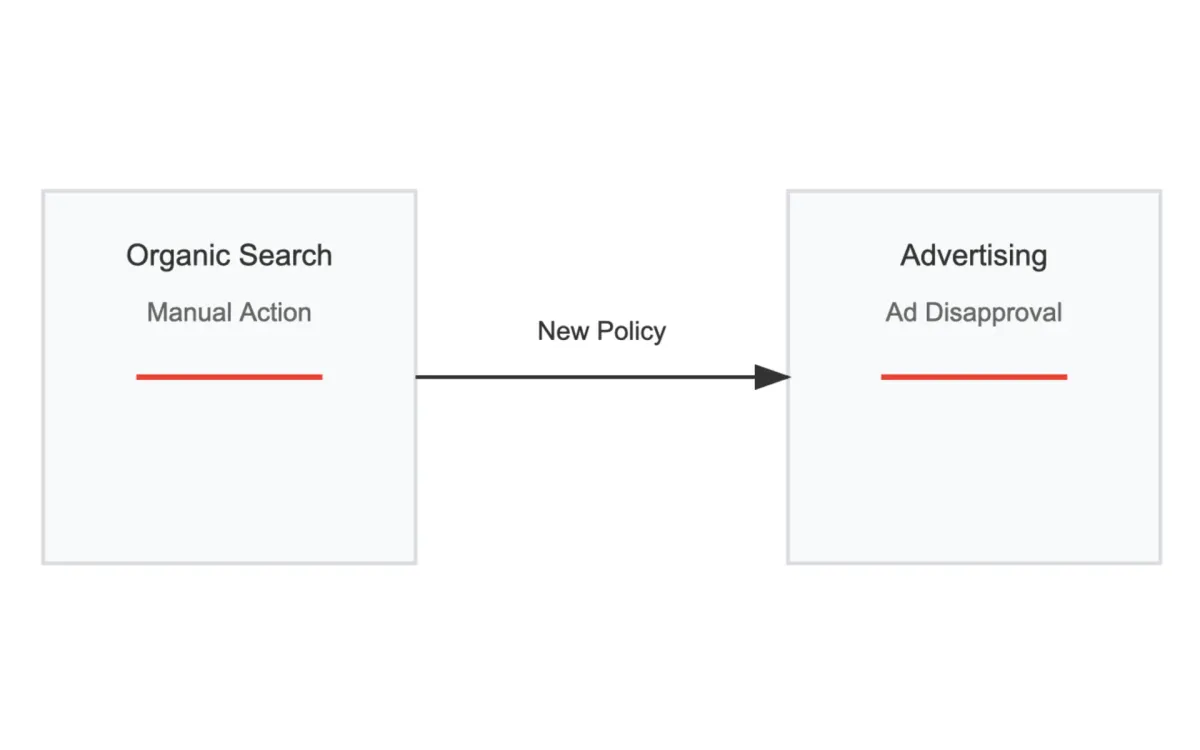
In a landmark shift announced on December 23, 2024, Google will, for the first time in its history, directly connect organic search penalties with advertising privileges. According to the official documentation, the new policy creates an unprecedented link between manual actions in search results and advertising eligibility.
This fundamental change marks a significant departure from the company's traditional approach, where search ranking penalties and advertising restrictions operated independently. Starting December 2024, websites removed from organic search results through manual actions will automatically face advertising disapproval.
The historical significance of this change lies in its bridging of two previously separate systems. Since the inception of Google Ads in 2000, then known as AdWords, the platform operated independently from organic search penalties. Sites penalized in search results could still maintain their advertising presence, creating a potential loophole in quality enforcement.
Manual actions in Google Search, introduced over a decade ago, traditionally affected only organic search visibility. These penalties, issued when sites significantly violate quality guidelines, never automatically extended to advertising capabilities. The new policy fundamentally alters this long-standing separation.
The integration carries substantial implications for digital marketing strategies. Businesses that previously relied on advertising to maintain visibility after search penalties must now ensure compliance across both platforms. This change effectively doubles the impact of quality violations, affecting both organic and paid traffic channels simultaneously.
Communication about penalties will continue through Google Search Console, the company's webmaster platform. According to the policy documentation, site owners receive notifications when manual actions affect their properties, allowing them to address violations before they impact advertising campaigns.
The timing of this announcement suggests a strategic shift in Google's approach to platform integrity. By implementing these changes in December 2024, the company signals a move toward more integrated quality control across its services, marking the end of the historical division between search and advertising enforcement.
This policy represents the first time Google has created explicit consequences in advertising based on organic search violations. The change reflects an evolution in digital marketing governance, where quality standards increasingly apply across all forms of online visibility.
Site operators now face a new reality where search optimization strategies directly affect advertising capabilities. This unprecedented connection encourages a more holistic approach to content quality, as violations in one area automatically impact performance in another.
The implementation establishes new precedent in digital advertising oversight. While search engines have long penalized low-quality content in organic results, this marks the first instance of such penalties automatically extending to paid promotion capabilities.
This shift affects the entire digital marketing industry, requiring agencies and marketers to adapt their strategies. The connection between search penalties and advertising restrictions creates stronger incentives for maintaining high-quality content standards across all digital properties.
The policy change reflects growing sophistication in platform governance. By connecting previously separate enforcement mechanisms, Google creates a more comprehensive system for maintaining content quality across its ecosystem.
Financial implications extend beyond immediate advertising restrictions. Businesses must now consider how search optimization decisions might affect their ability to maintain paid promotion channels, potentially impacting multiple revenue streams simultaneously.
The December 2024 implementation date provides operators time to review their content and ensure compliance with search quality guidelines. This timing indicates a measured approach to policy enforcement, balancing the need for immediate action with practical considerations for implementation.
This unprecedented change marks a significant evolution in digital marketing oversight, creating new standards for content quality enforcement across search and advertising platforms. The policy establishes a clear precedent for integrated quality control in digital marketing.

